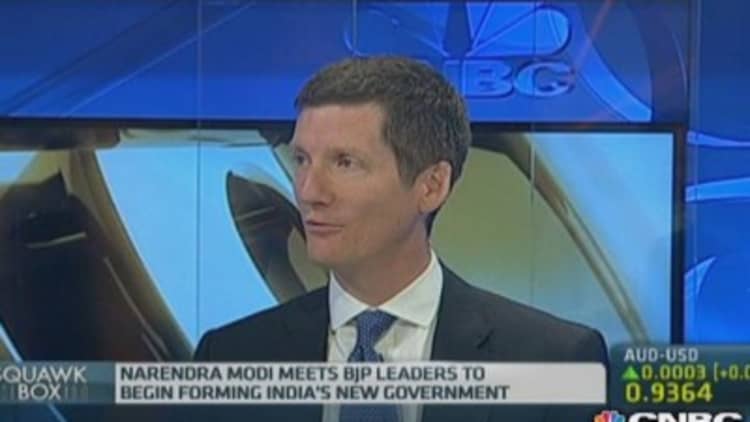Indian stocks have turned in a solid performance so far this year, and they've caught the attention of global investors. Of the four so-called "BRIC" economies—Brazil, Russia, India and China—it's India that's the top performer so far this year, up about 15 percent.
The rally in the benchmark Sensex is largely being credited to Narendra Modi and his sweeping victory in the race to become India's next prime minister. Modi's "toilets before temples" and "less government and more governance" campaign won over citizens and handed a landslide victory to his Bharatiya Janata Party (BJP).
Modi's win wasn't a big surprise for the business community—which has watched his campaign closely for months— BJP's better-than-expected showing in the lower house of the Parliament was.
Experts told CNBC that the apparent mandate from the voters will make it easier for Modi to push through his economic reform policies. But, perhaps mindful of the way many economic "reformers" from India's past have fallen flat on their faces, India-watchers advise investors to gauge the country carefully before jumping in with feet first.
International market analyst John Krey of S&P Capital IQ told CNBC that any continuation of the Indian stock rally really depends on whether Modi delivers on his promise of economic reform.
Read MoreIndia's Modi gets hero's welcome as he brings new era to New Delhi
"Prime Minister Modi must show firm resolve to introduce market-based solutions for deregulating key industries—especially retail," he said. "In fact, his entire economic, political and regulatory reform program must be spelled out quickly and decisively. (Modi) can't afford to waste any time, or his regime will lapse into the same routine of all previous regimes since India achieved independence."
Jina Ventures founder and Managing Director Ron Shah said he's bullish on Indian stocks, at least in the short term.
"Yes, expect stock market euphoria through the week," he said. "Indian stocks have massive upside potential, especially the banks."
But what about for the rest of the year? Aside from Modi's promise of economic reform, Shah said the market is waiting for guidance on two subjects: foreign direct investment (FDI) and public-private partnerships (PPP).
Foreign companies such as Wal-Mart have found it consistently difficult to break into India. If Modi is able to find a way to encourage foreign investment without taking a significant chunk of business away from local vendors—an important and active voting block—experts say that could be a boon for the economy and would improve sentiment around investing in India.

Jonah Blank, senior political scientist at Rand Corporation, said that for Indian consumers, the entry of big, so-called "multi-brand" shops is a big advantage. For Indian shop owners, however, it could mean being put out of business.
"India will have to balance those two parts of the economy," he said.
If Modi does make it easier for big, foreign retail chains to enter India, it would mark a turn in BJP's traditional viewpoint.
"In the 1990s BJP's philosophy was computer chips, not potato chips," said Blank, which summed up the current view of foreign investment in India. "Under Modi, the BJP philosophy could be computer chips and potato chips."
Warning against 'election euphoria'
With the Sensex hitting new new highs over the past month, however, some investors are asserting that Indian stocks are getting expensive.
According to BTIG research, the MSCI India trades at 15.4 times forward earnings estimates, and a price-to-book ratio of just under three. BTIG's Chief Strategist Dan Greenhaus said in a research note that it's more expensive on these metrics than either the or MSCI BRIC indices.
Valuation is a concern as well for Geoff Dennis, head of Global Emerging Market Strategy at UBS. Indian stocks are not cheap, and it is for that reason that the Sensex may not have further room to run, he said.
Read MoreIndia startups brave the new world of wearables
"Investors have to go back to looking at the [Indian] market from a fundamental standpoint instead of focusing on the election euphoria," Dennis said. "The market has priced in an economic reform. It is now a show-me story from Modi."
Another risk is sheer volatility. Earlier this year, investors made a massive exodus from emerging markets on rising geopolitical tensions and worries about the U.S. Federal Reserve raising interest rates.
"Stock market investors have always been flighty about India," said Shah of Jina Ventures. "When times are good they pour in, and they leave just as fast. Stocks will need to maintain steady growth for at least 1-2 quarters to assure that the the 'hot money' is in India to stay."
—By CNBC's Seema Mody.


